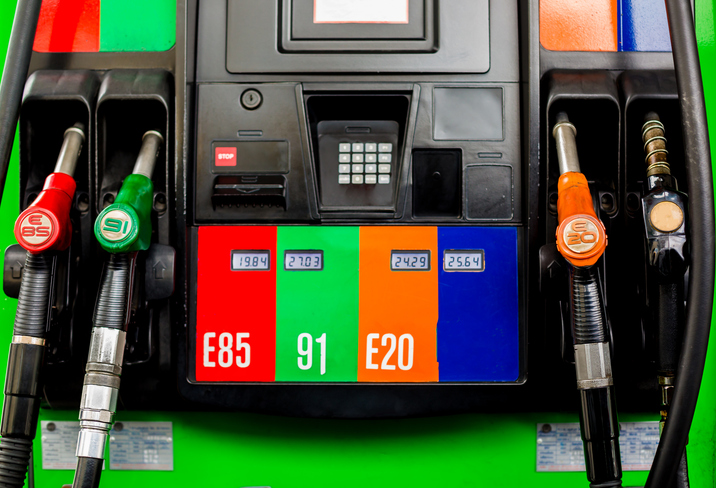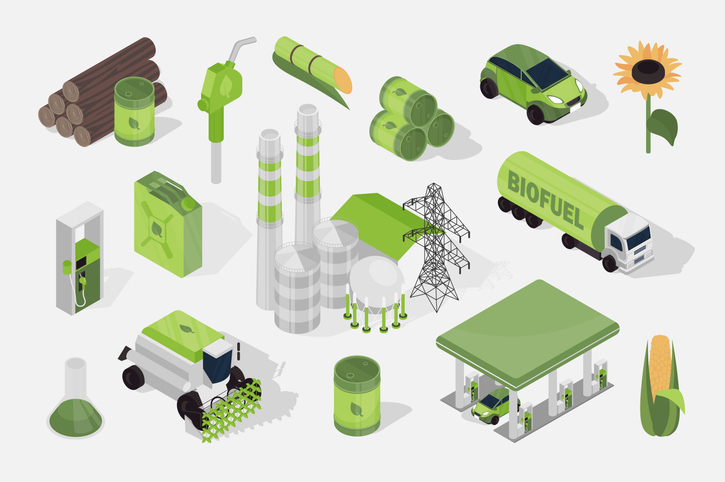ETHANOL
Ethanol is a renewable fuel made from plant materials such as corn and other biomass. It is widely used in the U.S., with over 98% of gasoline containing some ethanol to oxygenate the fuel and reduce air pollution. The most common blend is E10, which consists of 10% ethanol and 90% gasoline, while other blends like E15 and E85 are also available. E85, also known as flex fuel, contains 51% to 83% ethanol depending on the region and season and is designed for flexible fuel vehicles (FFVs).
BIODIESEL
Biodiesel is a renewable, domestically produced fuel made from vegetable oils, animal fats, or recycled restaurant grease. It is a clean-burning alternative to petroleum diesel and can be used in diesel vehicles and equipment without modification. Biodiesel meets the biomass-based diesel and advanced biofuel requirements of the Renewable Fuel Standard and offers several benefits for the environment and public health.
BENEFITS OF BIOFUELS
Key benefits of ethanol include:
- Renewable and Domestic: Ethanol is produced domestically from sustainable crops, supporting energy independence.
- Reduced Greenhouse Gas Emissions: Ethanol can reduce lifecycle greenhouse gas emissions by 40% compared to gasoline, with even greater reductions when cellulosic feedstocks are used.
- Improved Air Quality: Ethanol blends help decrease tailpipe emissions, contributing to better public health and environmental outcomes.
- High Octane Performance: Ethanol’s high-octane number enhances engine performance and efficiency, with potential for further improvements in fuel economy if engines are optimized for higher ethanol blends.

Ethanol is an important part of transitioning to a cleaner, more resilient transportation system by reducing reliance on petroleum and supporting sustainable energy solutions.
Key benefits of biodiesel include:
- Reduced Lifecycle Emissions: Using pure biodiesel (B100) reduces lifecycle greenhouse gas emissions by up to 74% compared to petroleum diesel.
- Improved Air Quality: Biodiesel combustion produces fewer particulate and air toxics emissions, improving overall air quality.
- Compatibility: Biodiesel blends can be used in existing diesel engines without major modifications.
- Renewable and Biodegradable: Produced from sustainable feedstocks, biodiesel is a renewable fuel that contributes to energy security.
- Supports Domestic Economy: Biodiesel production supports local agriculture and reduces reliance on imported fuels.

The adoption of biodiesel as part of the clean transportation transition is crucial for reducing greenhouse gas emissions and promoting a resilient and sustainable energy system.
BIOFUELS IN TEXAS
The DFWCC and our host organization, the North Central Council of Governments, work to improve air quality by promoting clean, reliable, accessible, and sustainable transportation technologies, including alternative fuels like biodiesel and ethanol.
The North Central Texas Organic Waste to Fuel Feasibility Study
Led by NCTCOG and UTA with EPA support, this study evaluates the potential for using organic waste, anaerobic digestion, and renewable natural gas (RNG) technologies to address rising waste generation in the rapidly growing region. The Waste to Fuel study aims to identify pilot projects that divert food waste and biosolids to produce RNG for vehicle fuel, involving stakeholders through advisory groups and public workshops.
City of Southlake Biofuels Success Story
The City of Southlake started investing in flex-fuel vehicles for its fleet in 2012 and has continued to grow its alternative fuel fleet over the past decade. Read Southlake's success story to learn more about the City's alternative fuel journey.
City of Denton Biofuels Success Story
Learn how the City of Denton used American Recovery and Reinvestment Act funds provided by NCTCOG to expand and serve their alternative fuel fleet.
Texas Renewable Funds Biorefinery in Bon Wier
In 2022, Governor Greg Abbott today announced that USA BioEnergy, through its subsidiary Texas Renewable Funds, will build a new $1.7 billion advanced biorefinery in Bon Wier, Texas. The biorefinery will convert one million green tons of wood waste into 34 million gallons annually of premium clean burning transportation fuel including Sustainable Aviation Fuel, Renewable Diesel, and Renewable Naphtha.
BIOFUELS AT THE FEDERAL LEVEL
U.S. Department of Energy Bioenergy Technologies Office (BETO)
BETO conducts transportation biofuels research that aims to accelerate the production of climate-friendly, sustainable fuels capable of decarbonizing heavy modes of transportation.
FIND A BIOFUEL STATION
RESOURCES
General Information
- Ethanol (Alternative Fuels Data Center)
- Biodiesel (Alternative Fuels Data Center)
- Transportation Biofuels (U.S. Department of Energy)
Laws and Incentives
- Ethanol Laws and Incentives in Texas (Alternative Fuels Data Center)
- Federal Ethanol Laws and Incentives (Alternative Fuels Data Center)
- Biodiesel Laws and Incentives in Texas (Alternative Fuels Data Center)
- Federal Biodiesel Laws and Incentives (Alternative Fuels Data Center)
- Biodiesel Manufacturing: Rules for Operating in Texas (Texas Commission on Environmental Quality)
Locate Fueling Infrastructure
- Find an Ethanol Refueling Station (Alternative Fuels Data Center)
- Find a Biodiesel Refueling Station (Alternative Fuels Data Center)
Biofuel Safety
- Ethanol Codes, Standards, and Safety (Alternative Fuels Data Center)
- Biodiesel Codes, Standards, and Safety (Alternative Fuels and Data Center)
